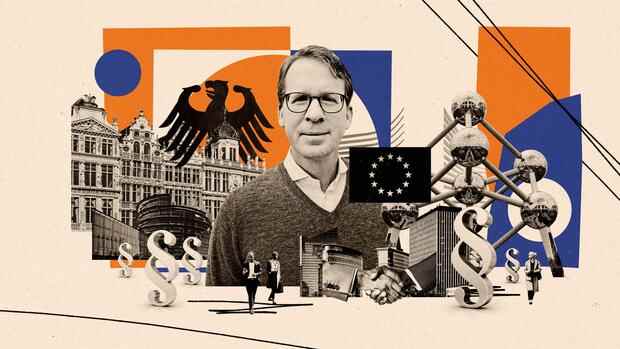Every week, Moritz Koch, head of the Handelsblatt office in Brussels, analyzes trends and conflicts, regulatory projects and strategic concepts from the inner workings of the EU. Because anyone interested in business needs to know what’s going on in Brussels. You can reach him at: [email protected]
20 years ago, the US political scientist Robert Kagan condensed the alienation between the US and the EU in the anti-terrorist war into a single, astute sentence: “Americans come from Mars, Europeans from Venus.”
Americans, Kagan argued, were following the god of war, Mars, and the understanding that in an anarchic world, violence may be necessary to ensure security. The Europeans, on the other hand, had set themselves up in a “post-historical paradise”, on the planet of love, Venus, and thought they had replaced the law of the strong with the strength of the law.
On February 24, 2022, the day of the Russian invasion of Ukraine, Europeans were expelled from their paradise. “Two weeks ago, Russia brought the war back to Europe,” declared the EU states at their summit in Versailles. From the dream: The Europeans come from Venus – and in the future they will have to make their way on Mars.
This comes as a shock to many in the EU. But one member state is finding it particularly difficult to assert itself in the changed reality: the Federal Republic. Because the belief in the juridification of international politics and the overcoming of conflicts through economic integration was nowhere as pronounced as in Berlin.
Top jobs of the day
Find the best jobs now and
be notified by email.
The still young government made up of SPD, Greens and FDP reacted to the “turning point” (Chancellor Olaf Scholz) with remarkable determination. What just seemed unthinkable is suddenly supported by broad majorities: Germany is supplying arms to Ukraine, is arming itself, is reducing its dependence on Russian gas, and is waking up from decades of geopolitical slumber.
Historical miscalculation
But even if there is great relief in the rest of Europe about the German course correction: the turning point in Europe goes hand in hand with a loss of prestige and influence for the Federal Republic. It is not only Germany’s naivety that is taking revenge, but also the arrogance with which the Germans have long acted in the EU.
At the height of the euro crisis, the then leader of the Union faction, Volker Kauder, triumphed: “All of a sudden, German is being spoken in Europe.” A sentence that reverberates to this day because of its history-forgotten arrogance.
In any case, it will be about as difficult to market the German energy transition model in Europe in the future as it is to find buyers for Russian government bonds. The energy partnership with Russia, including the Nord Stream 2 Baltic Sea pipeline, which was pushed ahead against fierce resistance from Eastern Europe, has turned out to be a historic miscalculation. The idea of placing security of supply in Russian hands always seemed bold, but now it is proving to be insane.
Other countries, which for a long time had to be lectured by Germany about their economic policy deficits, were smarter. France, for example, can feel vindicated on key strategic issues. For years, French President Emmanuel Macron has been warning of the risks of one-sided dependence on raw materials, and for years he has been warning of the EU’s transformation from market to power.
Political gravitational core in Paris
Now is his hour. In Versailles, the heads of state and government decided to strengthen European energy sovereignty and to transform the EU from a peace project to a defense community.
“The Russian war of aggression represents a tectonic shift in European history,” the summit statement said. A consequence of this “tectonic shift” is also a change in the intra-European balance of power. The Federal Republic remains the economic powerhouse of the continent, but the political center of gravity shifts to Paris.
>> Track here the current developments in the Ukraine war in our news blog
In the decisive European debates, France is now setting the tone, not Germany, which has yet to learn how to think strategically again. The Eastern Europeans will also strengthen their influence. You warned early on about the military threat posed by Russia. In Berlin they were laughed at for it.
The costs of Germany’s short-sightedness can now be seen in Russia’s trade balance: the EU transfers hundreds of millions of euros to Moscow every day to pay for Russian oil and gas supplies. The boycott of Russian raw material imports desperately demanded by the Ukraine fails because of the dependence of the Federal Republic.
Europe is stuck in the energy trap – thanks to bad German decisions. The credibility of German politics has been severely damaged and will not recover any time soon.
More: The EU is laying the groundwork for a defense union – but the path to get there is rocky
